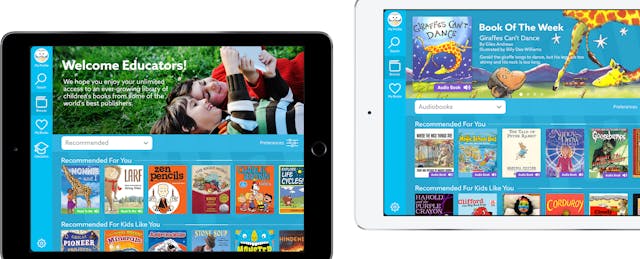Building a “Netflix for books” service has proven notoriously difficult. The past three years has witnessed a number of efforts, including Oyster, Entitle and Scribd, shut down or shake up their business models. Yet one player seems to be bucking the trend—and has been able to convince investors that it can be the anomaly.
Epic, which offers a digital subscription service for children’s books, has just raised $8 million in a Series C round led by Reach Capital. Other investors include TransLink Capital, Rakuten Ventures, Menlo Ventures, WI Harper, Brighteye Ventures and Innovation Endeavors. The Redwood City, Calif.-based company has now raised a total of $21.4 million in venture funding.
Epic launched its Netflix-like subscription service in 2014 with 5,000 digital books. Now it boasts more than 25,000 titles, including graphic novels, audiobooks and videos, from over 250 publishing partners. (The company pays a licensing fee for these rights.) Epic tailored its subscription plan for the consumer market, charging parents $4.99 per month for unlimited access to the digital library.
Available on the web, iOS, Android and Kindle devices, Epic currently reaches five million children, its co-founder Kevin Donahue claims, with 24 million books read in April alone. He declined to share any ballpark estimates for subscription numbers, only offering that the company is “close” to being cashflow positive.
Today, Epic’s focus is on expanding its footprint across K-6 districts. It currently claims usage in 87 percent of U.S. elementary schools. Much of that growth, Donahue says, can be attributed to the fact that Epic is free for use in schools. This version allows teachers to create, assign and share collections of reading materials, audiobooks, videos and quizzes. Should they choose, they can also make these lists publicly visible to any Epic subscriber, at school or at home.
“What’s exciting to us is the involvement of teachers,” Donahue, a former YouTube and Disney executive, tells EdSurge. Offering Epic in both the consumer and school markets “creates a symbiotic relationship between home and classroom reading activities, [as] teachers get involved in creating quizzes and collections of content that our broader community can access.”
For children who have access Epic at both home and school, the platform offers linkages. Parents can share what their kids are reading to their teachers, who in turn can also let parents know what’s being read in class. Even more, teachers can assign homework reading to kids at home.
These features may benefit students who are fortunate enough to have access at both home and school. Yet it raises an equity issue for those who don’t—or whose parents can’t afford a subscription. Donahue admits these scenarios “are not perfect, [and] we’d like every child to have access at home as well as in school.”
With the funding, Epic will look to expand its marketing and engineering teams, along with its content library. Beyond books, the company offers a growing collection of short-form videos from the likes of BBC and Sesame Street, along with content produced by independent producers on everything from playing Minecraft to training puppies. Adding more variety to the content allows “us to enable children to explore their interests in a self-directed way, and in doing so learn new things,” says Donahue.
With other digital book subscription providers waning, he claims there’s only one competitor he’s eyeing: Amazon. So far, Epic is expanding its footprint at a brisk clip: Epic is second highest grossing app on the iOS store, according to AppAnnie.


